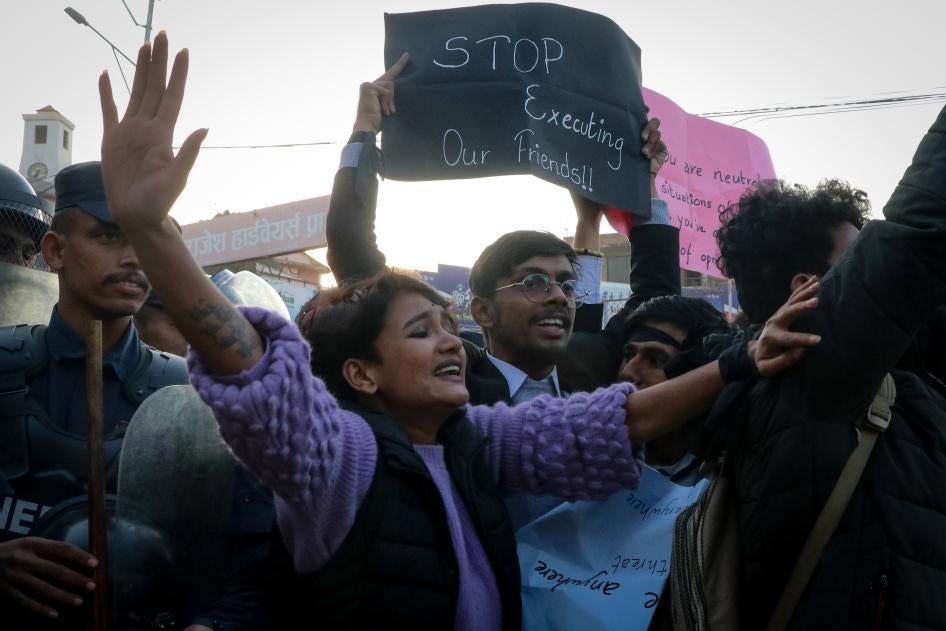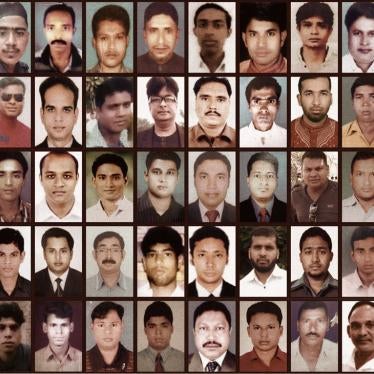(New York) – The Myanmar military junta should immediately commute the death sentences recently handed down against 10 prisoners, Human Rights Watch and the Assistance Association for Political Prisoners (AAPP) said today. The junta should impose a moratorium on the death penalty with the aim of abolishing capital punishment in the country.
Death sentences for 10 people, including 7 university students, by military courts follow the executions of four political prisoners in July 2022 that resulted in broad international condemnation. All these convictions followed grossly unjust closed-door trials that fell far short of international fair trial standards.
“Myanmar’s junta should immediately commute the sentences of all those facing the death penalty, a cruel punishment that most of the world rejects,” said Manny Maung, Myanmar researcher at Human Rights Watch. “For those governments that have hesitated to impose targeted sanctions against the junta for its long list of rights violations, the new death sentences should be a clear signal to take action now.”
On November 30, a closed military court in Yangon handed down the death sentences for the seven students, all members of the Dagon University Students’ Union, under section 302 of Myanmar’s penal code. The tribunal convicted the students for involvement in a shooting that killed a former military officer in Yangon in April. Police arrested all seven in April shortly after the alleged shooting.
The students are Khant Zin Win; Thura Maung Maung; Zaw Lin Naing; Thiha Htet Zaw; Hein Htet; Thet Paing Oo; and Khant Linn Maung Maung.
A military court also sentenced Wai Zin Yan, Thu Htoo Aung, and Min Htet Thar to death under section 302 of the penal code for a separate incident in June, for allegedly shooting and killing a ward administrator in north Yangon on May 24, 2022.
Myanmar’s secretive military tribunals have long shown complete disregard for basic human rights protections and failed to uphold international due process and fair trial standards. Those on trial before military tribunals face almost certain conviction regardless of the available evidence against them. Families, the public, and foreign diplomats have no access to trials. Convictions are frequently based on confessions obtained by torture and other ill-treatment, including frequent beatings.
The new United Nations high commissioner for human rights, Volker Turk, expressed alarm at the new death sentences in a December 2 statement: “By resorting to use death sentences as a political tool to crush opposition, the military confirms its disdain for the efforts by ASEAN and the international community at large to end violence and create the conditions for a political dialogue to lead Myanmar out of a human rights crisis created by the military.”
Military tribunals in Myanmar have sentenced 138 people to death since the February 2021 military coup, including 41 in absentia. The Association of Southeast Asian Nations (ASEAN) and concerned governments should press the junta to immediately commute all death sentences and release all those wrongfully imprisoned.
ASEAN member states and other concerned governments should press the UN Security Council to impose an arms embargo and refer the country situation for Myanmar to the International Criminal Court.
The July 25 executions were the first death sentences carried out in Myanmar in over 30 years. The men put to death were Phyo Zeya Thaw, 41; Kyaw Min Yu, known as “Ko Jimmy,” 53; Hla Myo Aung; and Aung Thura Zaw. A military tribunal sentenced Ko Jimmy and Phyo Zeya Thaw to death on January 21 under Myanmar’s overbroad Counterterrorism Law of 2014. Hla Myo Aung and Aung Thura Zaw were convicted in April 2021 for allegedly killing a military informant.
Human Rights Watch and the AAPP oppose the death penalty in all circumstances and have long called on Myanmar to ban all capital punishment. Capital punishment is unique in its cruelty and finality, and is universally plagued with arbitrariness, prejudice, and error.
“The Myanmar junta’s threats are aligned with military courts that have continually failed to protect any basic principles of fair trial process or to demonstrate independence and impartiality,” said Ko Bo Gyi, co-founder for the Assistance Association for Political Prisoners. “Swift condemnation and concerted pressure and unified, targeted sanctions is what is necessary to end the junta’s violations.”








